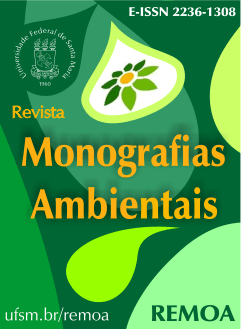Educação ambiental e a química licenciatura: as concepções de professores
DOI:
https://doi.org/10.5902/223613087811Keywords:
Environmental Education, Undergraduate Studies, Chemistry Teaching CourseAbstract
This study presents data obtained in a study that monograph was presented and developed in the Post-graduate Program of Environmental Education, an Specialization Program of the Rural Sciences Centre in Federal University of Santa Maria, of the research line Education, Society and Culture. Such study was developed in order to understand the scope and meanings of Environmental Education for professors of the Chemistry Teaching Course in UFSM. The justification to develop such study was the need to analyse the insertion of Environmental Education in the conception of professors, therefore stimulating new perceptions and reflections on such theme in the Course. The method employed followed a qualitative approach, that is, it privileged the conscious and subjective aspects of the professors who participated on the research. One of the instruments used to perform the data collection was the questionnaire, aiming to register the representations and perceptions of the professors concerning Environmental Education. Analysis of data revealed that these professionals, when asked about their role in society as educators of conscientiousness and new ways of thinking, worry about the social and cultural aspects that constitute the undegraduate student/citizen who is enrolled on Chemistry Course.
Downloads
References
CARVALHO, I. C. M. Educação Ambiental Crítica: nomes e endereçamentos da educação. In: LAYRARGUES, P. P. (coord.). Identidades da educação ambiental brasileira. Brasília: Ministério do Meio Ambiente, 2004. 156p.
_________. Educação ambiental: a formação do sujeito ecológico. 2. ed São Paulo: Cortez, 2006.
CASTRO, R. S. de; LOUREIRO, C. F. B.; LAYRARGUES, P. P. (orgs.). Sociedade e Meio Ambiente: a educação ambiental em debate. São Paulo: Cortez, 2000.
LEFF, E. (coord.): tradução de Eliete Wolff. A Complexidade ambiental. São Paulo: Cortez, 2003. 342 p.
LOUREIRO, C. F. B. Educação Ambiental Transformadora. In: LAYRARGUES, P. P. (coord.). Identidades da educação ambiental brasileira. Brasília: Ministério do Meio Ambiente, 2004. 156p.
MARCONI, M. de A.; LAKATOS, E. M. Técnicas de Pesquisa: planejamento e execução de pesquisas, amostragem e técnicas de pesquisa, elaboração, análise e interpretação de dados. 2. ed. São Paulo: Atlas, 1990.
MININNI, M. N. “Amazônia: Uma proposta interdisciplinar de educação ambiental”. In: SGUAREZZI, N de O. Análise de um programa de formação de recursos humanos em educação ambiental. Instituto Brasileiro do Meio Ambiente e dos Recursos Naturais Renováveis (IBAMA), 1997.
MORIN E. Por uma Reforma do Pensamento. In: PENA VEGA (org.). O pensar Complexo. Rio de Janeiro: Garamond, 1999.
REIGOTA, M. Meio Ambiente e representação social. 7. ed. São Paulo: Cortez, 2007. (Coleção Questões da Nossa Época; v. 41).
TRIVIÑOS, A. N. S. Introdução à pesquisa em ciências sociais: a pesquisa qualitativa em educação. São Paulo: Atlas, 1987.
VASCONCELLOS, P. A. da S. de, Educação Ambiental no Curso de Licenciatura em Química: as concepções dos professores. 2010. 43p. Monografia (Especialização) Programa de Pós-Graduação de Educação Ambiental, Universidade Federal de Santa Maria, Santa Maria, RS.
UNESCO. Environmental Education. The main guidance from the Tbilisi Conference. Paris: Unesco, 1980.
Downloads
Published
How to Cite
Issue
Section
License
Ethical guidelines for journal publication
The REMOA is committed to ensuring ethics in publication and quality of articles.
Conformance to standards of ethical behavior is therefore expected of all parties involved: Authors, Editors, Reviewers, and the Publisher.
In particular,
Authors: Authors should present an objective discussion of the significance of research work as well as sufficient detail and references to permit others to replicate the experiments. Fraudulent or knowingly inaccurate statements constitute unethical behavior and are unacceptable. Review articles should also be objective, comprehensive, and accurate accounts of the state of the art. The authors should ensure that their work is entirely original works, and if the work and/or words of others have been used, this has been appropriately acknowledged. Plagiarism in all its forms constitutes unethical publishing behavior and is unacceptable. Submitting the same manuscript to more than one journal concurrently constitutes unethical publishing behavior and is unacceptable. Authors should not submit articles describing essentially the same research to more than one journal. The corresponding author should ensure that there is a full consensus of all co-authors in approving the final version of the paper and its submission for publication.
Editors: Editors should evaluate manuscripts exclusively on the basis of their academic merit. An editor must not use unpublished information in the editor's own research without the express written consent of the author. Editors should take reasonable responsive measures when ethical complaints have been presented concerning a submitted manuscript or published paper.
Reviewers: Any manuscripts received for review must be treated as confidential documents. Privileged information or ideas obtained through peer review must be kept confidential and not used for personal advantage. Reviews should be conducted objectively, and observations should be formulated clearly with supporting arguments, so that authors can use them for improving the paper. Any selected referee who feels unqualified to review the research reported in a manuscript or knows that its prompt review will be impossible should notify the editor and excuse himself from the review process. Reviewers should not consider manuscripts in which they have conflicts of interest resulting from competitive, collaborative, or other relationships or connections with any of the authors, companies, or institutions connected to the papers.






